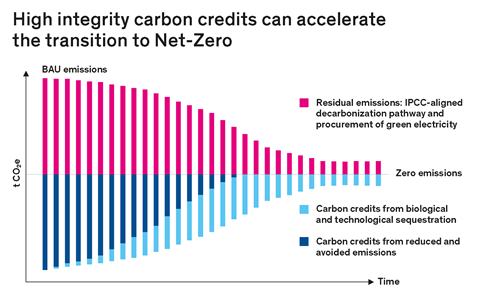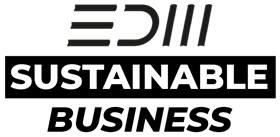In the fight against climate change, companies must now take responsibility and step up efforts in the area of climate protection. This is true even if strategies and plans are not yet perfectly developed. Inaction and hesitation out of fear of possible criticism harm everyone: the climate and the companies themselves. A plea for quick action and against inconsiderate “greenwashing” accusations.
Stopping climate change is our global task of the century. Unfortunately, we are three ways behind in tackling this task: Total greenhouse gas emissions, time, and money.
As a society, we are still emitting far too many greenhouse gases. No matter whether you look at the reports of the Intergovernmental Panel for Climate Change or the presentation of the Climate Action Tracker. Also, the decarbonization of our economy and our lives is still well behind schedule. For mobility and production, we keep on pumping and, above all, burning fossil fuels.
A shockingly unnecessary reason for this is that it is still worth it. The cost of switching energy supplies to renewables and changing processes and supply chains - transportation is just one small example in a larger problem area - still seems to be considered higher than continuing with the status quo. Admittedly, we also see “divestment” activities, i.e., a stop to all financing of fossil industries, which should not be underestimated. Nevertheless, these existing business models are still seen as tempting diversifying investments, especially from the perspective of large pension and retirement funds. Where climate change is already being experienced today, it deprives people of their livelihoods. Mitigation and recovery mechanisms exist, but financial resources are lacking.
These three aspects - that we are emitting too many emissions, that we are behind schedule, and that we are underfunding or misfunding - reinforce each other. To overcome this dilemma, every immediate contribution counts. The rule that “fast” beats “perfect” also applies to climate protection.
![]()
Too afraid of Trial and Error
The “trial and error” principle, i.e., a typically Anglo-Saxon approach, is a tried and tested method for corporate climate protection as well. Unfortunately, there are concerns that a climate plan that has not yet been fully thought through and strategically implemented will provoke a negative, contrary reaction; after all, no company wants to be suspected of greenwashing. Not to be misunderstood: No one denies that there is such a thing as “greenwashing.” But “real” greenwashing is much less often behind actual accusations than it might seem. Indeed, empty bluster, the deliberate exaggeration of small, ineffective fig leaf activities, is wrongly conflated in the debate with climate protection in its early stages and with a learning curve. And as a result, the accusations of “greenwashing” achieve the opposite effect. Efforts in climate protection are kept on a low flame, concealed or not implemented at all, which is fatal.
Long-distance race of corporate climate protection
The path to a sustainable economy is a marathon, not a sprint. The goal is clear: companies should aim for “net-zero” operations. Net-zero deliberately accepts the lowest possible residual emissions, which are then offset, for example, by projects that remove CO2 emissions from the atmosphere (carbon capture). In terms of today, this means that CO2 emissions must be drastically reduced at the corporate level.
Such a reduction requires a comprehensive change in strategy and mindset within the company, a questioning and adjustment of processes deep into the supply chain, as well as external factors such as a change in the general conditions and infrastructure (transport routes, energy supply). In addition to these fields, which are to be implemented and have an effect in the long term, there are also many immediate measures, “quick wins” in the company and at the product level. Whether in packaging or the business travel policy, in the energy mix in offices and stores, or the calculation and compensation of emissions from a specific product group.
All of these starting points make sense for the climate, and they have an immediate effect. They do not buy a company off from long-term change. Instead, they create awareness and, in many cases, provide the basis for tackling and successfully mastering the major long-term tasks.
Transparent communication is no greenwashing
Therefore, it is not at all dishonorable to communicate about such initial measures, even if, for example, the supply chain still hides the large and difficult-to-target emission sources. Transparency is required: transparency with regard to one’s own processes, in the supply and value chain - “You can’t manage what you haven’t measured” - and transparency with regard to targets and transparency in communication.
Communicating goals is evidence of a company’s ambition. Communicating what has already been achieved or what is immediately planned inspires competitors and customers. For most companies, this means admitting that the road to “net-zero” is still long. Nevertheless, reporting on their own initial successes and first steps has nothing to do with greenwashing.

Paths for a successful, climate-friendly company
Companies have many ways to achieve effective climate protection: from individual projects to a holistic strategic approach. The earlier and faster these paths are taken, the more both climate and company will benefit in the end.
The cornerstone for sustainable corporate success lies in thoroughly examining the current situation by conducting a CO₂ balance sheet. This includes an analysis of existing processes and an in-depth look at the legal framework, the competitive environment and the risks of climate change for the company’s own business model.
The current situation indicates the ecological potential and the starting points for best leveraging this over time. In this way, targets are set, and the right focus is established. External initiatives such as the Science-based Targets Initiative (SBTi) point the way here.
Opportunities for short- and long-term climate protection can be found in very different areas: Greater efficiency and CO₂ reduction in processes, more climate-friendly products and services, positioning in the market, the company’s own employees as internal ambassadors for greater sustainability, sustainability projects in the supply chain, or all of the above.
Offsetting CO₂ emissions, in particular, is a popular target for “greenwashing” accusations. However, high-quality offset projects make valuable, measurable and direct contributions to climate targets and the global sustainability goals (UN Sustainable Development Goals, SDGs). Ecosystems and, to an even greater extent, people in less developed regions that are already harder hit by climate change will benefit. As a stand-alone climate protection effort, offsetting is less effective. Coupled with continuous reduction measures, however, and virtually eliminating itself from year to year, offsetting provides urgently needed, immediately effective climate protection.
The strategic integration of climate protection also includes the documentation of progress. Reporting in accordance with international standards such as the Greenhouse Gas Protocol (GHG) creates transparency and comparability.
Practice some greenwashing
The possibilities are numerous, especially if climate protection has played a minor role in corporate processes up to now. Given the urgency, every single step helps as long as it leads in the right direction. So, please, before you do nothing, do ”greenwashing.” Such potential criticism with this fighting term can be easily curbed: through transparent communication, setting further goals, all the way to strategic integration.
About myclimate
Myclimate is a partner for climate protection - globally and locally. Together with partners from the business community and private individuals, myclimate is committed to climate protection and sustainable development through consulting and educational services and its own CO2 offset projects. As a non-profit organization, myclimate pursues this goal in a market-oriented and customer-focused manner.
The Swiss foundation promotes measurable climate protection and sustainable development worldwide with carbon offset projects according to the highest quality standards (Gold Standard, Plan Vivo). In addition, myclimate encourages everyone to make a sustainable contribution to the future with action-oriented and interactive educational offers. Myclimate, based in Zurich, Berlin, Cologne, Reutlingen and Vienna, also provides advice on integrated climate protection with tangible added value. This is created through IT solutions, awards, analyses and resource management.

About the author:
Kai Landwehr works as head of marketing at ”myclimate,” a Swiss-based NGO focusing on climate protection and sustainability measures. He is an expert in communications and sustainability with strong expertise in sports and digitalization. Before tapping into climate protection, Landwehr has worked in the sporting goods industry as communications and brand manager at Nike for ten years.
Back to EDM Sustainable Business landing page.










